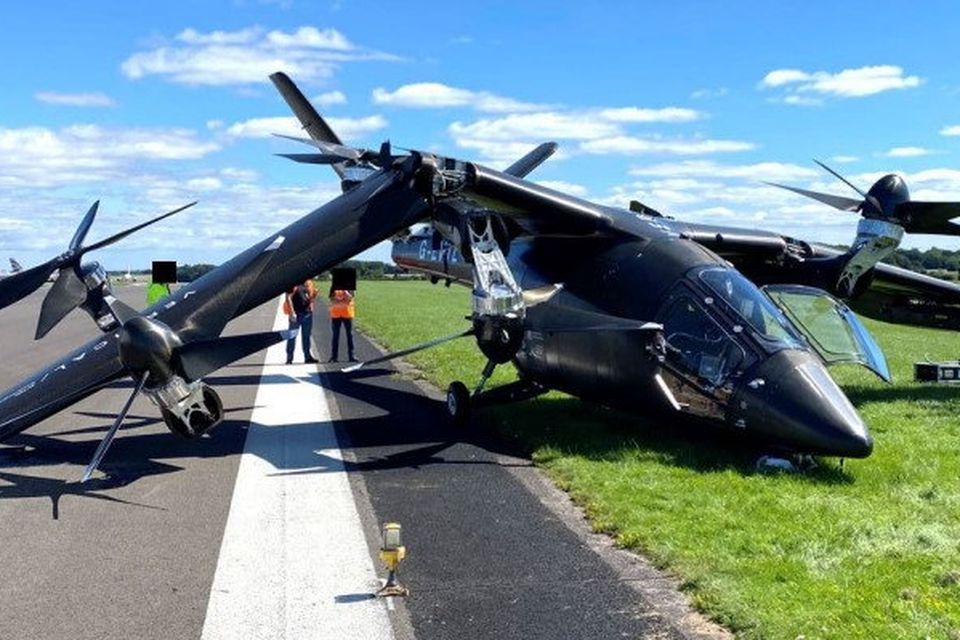Electric ‘air taxi’ firm Vertical Aerospace is suing former components supplier after test-flight crash
Business backed by Dublin-based jet lessor Avolon brings contract dispute case against Prodrive Composites
Vertical VX4 crashed after ‘failure of an adhesive bond’ during a test flight
Vertical Aerospace, the electric air taxi developer, is suing a British company that was involved in the development and manufacture of major components for its prototype aircraft.
Vertical, which was founded by Belfast-born businessman Stephen Fitzpatrick and which has been heavily backed by Dublin-based jet lessor Avolon, has launched the action in London’s Circuit Commercial Court against Prodrive Composites in what is listed as a contract dispute.
Last August, an experimental test flight of Vertical’s VX4 electric aircraft with a remote pilot ended as the vehicle crashed onto a runway.
A propeller blade had detached from the electric propulsion unit due to the failure of an adhesive bond.
An accident report published last week noted that Vertical was at the time in the process of introducing a blade design that would eliminate the “bonding failure mode”.
The legal action against Prodrive Composites was filed on Tuesday.
A spokesman for Vertical Aerospace said the company cannot comment on ongoing legal proceedings.
“But I can confirm that Prodrive are no longer a supplier to Vertical,” the spokesman said.
Prodrive Composites did not respond to a request for comment.
Shares in Vertical Aerospace, listed in New York, have lost much of their value since the company made its stock market debut in late 2021 with a market capitalisation of about $2.2bn (€2bn). It is now valued at $162m.
Vertical is one of a number of companies that is developing vertical take-off and landing electric air taxis that the firms are hoping will become major green transport modes in busy cities across the world.
Vertical has partnered with Rolls-Royce, Honeywell and Leonardo to develop the VX4 and associated battery technology.
But the planned commercial launch of the aircraft has already slipped. Last year, it pushed back its expected certification date for the VX4, which can carry four passengers, to 2026 from 2025.
“Attempting to predict a date with certainty when it is several years away is challenging and achieving it depends on agreeing compliance methods for new technology with the authorities,” it told shareholders last year.
The company notes that it has 1,500 pre-orders for the VX4, worth $6bn.
But those orders are not final and can be cancelled at any time.
“All of the pre-orders we have received to date are conditional and are subject to the occurrence of certain agreed-upon conditions with the respective parties, including that all such pre-orders may be terminated in writing without penalty by either party,” the company noted in its annual report.
“All of our pre-orders are not legally binding until we have executed a master purchase agreement between us and each party that contains the final terms for the purchase of our aircraft, including, but not limited to, the final number of aircraft to be purchased and the timing for delivery of the aircraft.”
Avolon agreed in 2021 to order 500 VX4 aircraft valued at $2bn from Vertical Aerospace.
Avolon subsequently placed those planned aircraft with carriers including Japan Airlines, AirAsia, Turkey’s Gozen Holding and Brazilian carrier Gol.
Avolon co-founder Dómhnal Slattery was the non-executive chairman of Vertical Aerospace from early 2022 to 2023.
He stepped down as CEO of Avolon at the end of 2022.
Avolon has participated in funding for Vertical Aerospace and it holds equity warrants in the business.
Join the Irish Independent WhatsApp channel
Stay up to date with all the latest news















